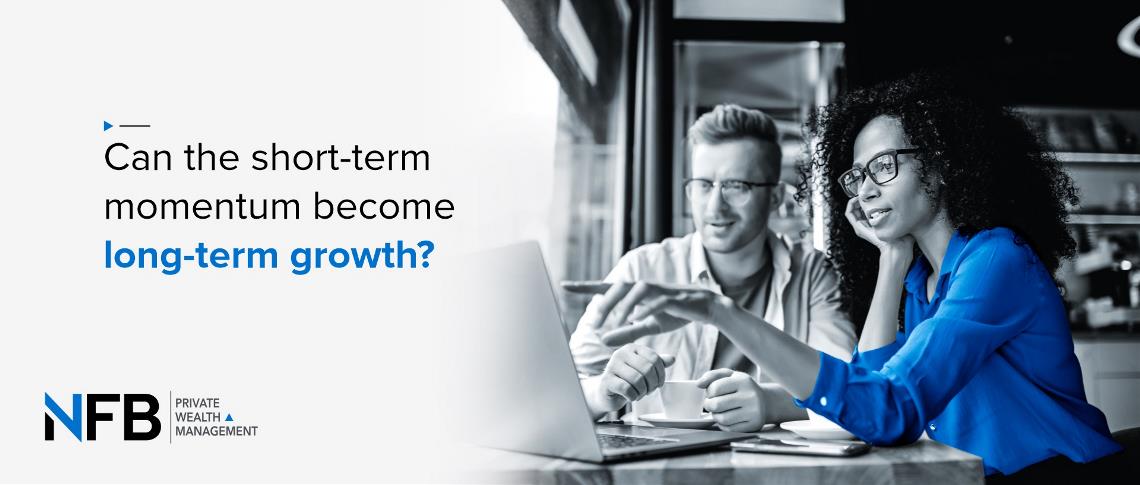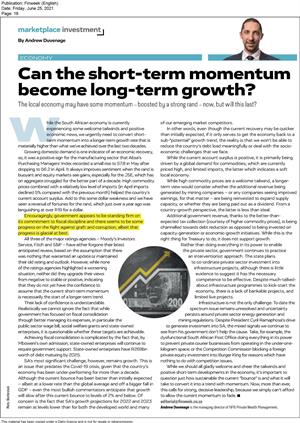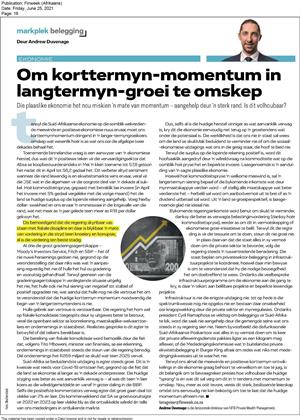Can the short-term momentum become long-term growth?
The local economy may have some momentum – boosted by a strong rand – now, but will this last?


While the South African economy is currently experiencing some welcome tailwinds and positive economic news, we urgently need to convert short-term momentum into a longer term growth rate that is materially higher than what we’ve achieved over the last two decades.
Growing domestic demand is one indicator of an economic recovery so it was a positive sign for the manufacturing sector that Absa’s Purchasing Managers’ Index recorded a small rise to 57.8 in May after dropping to 56.2 in April. It always improves sentiment when the rand is buoyant and equity markets see gains, especially for the JSE which has on aggregate struggled for the better part of a decade. High commodity prices combined with relatively low level of imports (in April imports declined 5% compared with the previous month) helped the country’s current account surplus. Add to this some dollar weakness and we have seen a reversal of fortunes for the rand which just over a year ago was languishing at over R19 for a dollar.
Encouragingly, government appears to be standing firm on its commitment to fiscal discipline and there seems to be some progress on the fight against graft and corruption, albeit that progress is glacial at best.
All three of the major ratings agencies – Moody’s Investors Service, Fitch and S&P – have either forgone their latest anticipated review based on the assumption that there was nothing that warranted an update or maintained their old rating and outlook. However, while none of the ratings agencies highlighted a worsening situation, neither did they upgrade their views from negative to stable or positive, indicating that they do not yet have the confidence to assume that the current short-term momentum is necessarily the start of a longer-term trend.
Their lack of confidence is understandable. Realistically we cannot ignore the fact that while government has focused on fiscal consolidation through better managing its expenses, in particular the public sector wage bill, social welfare grants and state-owned enterprises, it is questionable whether these targets are achievable.
Achieving fiscal consolidation is complicated by the fact that, by Mboweni’s own admission, state-owned enterprises will continue to require government support.
State-owned enterprises have R269bn worth of debt maturing by 2025.
SA’s most significant challenge, however, remains growth. This is an issue that predates the Covid-19 crisis given that the country’s economy has been under-performing for more than a decade. Although the current bounce has been better than initially expected – albeit at a lower rate than the global average and off a bigger fall in GDP – even the most bullish commentators anticipate that growth will slow after this current bounce to levels of 2% and below. Of concern is the fact that SA’s growth projections for 2022 and 2023 remain at levels lower than for both the developed world and many of our emerging market competitors.
In other words, even though the current recovery may be quicker than initially expected, if it only serves to get the economy back to a sub-‘potential’ growth trend, the reality is that we won’t be able to meaningfully reduce the country’s debt load or deal with the socio-economic challenges that we face.
While the current account surplus is positive, it is primarily being driven by a global demand for commodities which are currently priced high, and limited imports, the latter which indicates a soft local economy.
While high commodity prices are a welcome tailwind, a longer term view would consider whether the additional revenue being generated by mining companies – or any companies seeing improved earnings, for that matter – are being reinvested to expand supply capacity, or whether they are being paid out as a dividend. From a country-growth perspective, the latter is less than ideal.
Additional government revenue, thanks to the better-than-expected tax collection (courtesy of higher commodity prices), is being channelled towards debt reduction as opposed to being invested on capacity-generation or economic-growth initiatives. While this is the right thing for Treasury to do, it does not support growth.
Rather than doing everything in its power to enable the private sector, government continues to practice an interventionist approach. The state plans to co-ordinate private sector investment into infrastructure projects although there is little evidence to suggest it has the necessary competence to be effective. Despite much talked about infrastructure programmes to kick-start the economy, there is a lack of bankable projects, and limited live projects.
Infrastructure is not the only challenge: to date the spectrum issue remains unresolved and uncertainty persists around private sector energy generation and mining regulations. Despite President Cyril Ramaphosa’s drive to generate investment into SA, the mixed signals we continue to see from his government don’t help the cause. Take, for example, the dysfunctional South African Post Office doing everything in its power to prevent private courier businesses from operating in the under one kilogram space; or the Competition Commission blocking a foreign private equity investment into Burger King for reasons which have nothing to do with the competition issues that the Commission is mandated to deal with.
While we should all gladly welcome and cheer the tailwinds and positive short term developments in the economy, it’s important to question just how sustainable the current “bounce” is and what it will take to convert it into a trend with momentum. Now, more than ever, this calls for strong, decisive leadership because we simply can’t afford to allow the current momentum to fade.
|
This article, "Can the short-term momentum become long-term growth?" was written exclusively for Finweek Magazine. It was published in the 25 June 2021 edition. You can access the original print coverage in English here, and in Afrikaans here. |
|
 |
 |













